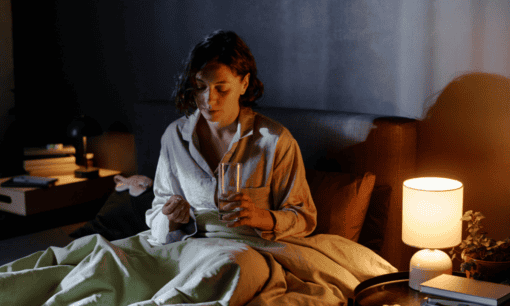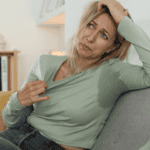I used to wake up three times a night, sometimes from a full-body sweat, sometimes just from this creeping restlessness that made me feel like my brain had forgotten how to turn off.
I’d toss the covers off, then pull them back up thirty seconds later because I was suddenly cold. It felt like my body was playing temperature roulette.
If that sounds familiar, you’re not alone.
Menopause is a complete reprogramming of your hormones, sleep patterns, and even your relationship with rest. The drop in estrogen and progesterone doesn’t just affect mood and metabolism. It also messes with melatonin, your internal thermostat, and your ability to stay asleep through the night.
The good news? Between natural remedies and a few smart tech tools, restful sleep is still completely within reach. You just have to learn how to work with your changing body, not against it.
Topic Contents
Quick Reference: What’s Helping Women Sleep Better During Menopause
Some nights, a simple tea does the trick. Other nights, nothing short of a cooling bed will do. Menopause sleep issues rarely have one cause, so the solution isn’t one-size-fits-all.
Below’s a quick reference table of natural sleep remedies, lifestyle tweaks, and smart tech tools that have helped me (and plenty of other women) sleep longer, cooler, and deeper through the chaos.
Use it as a menu, not a prescription: start small, and build from there.
| Remedy / Tool | Best For | Why It Works |
| Warm milk, chamomile tea, tart cherry juice | Bedtime relaxation | Natural tryptophan and melatonin boost calm the body before sleep |
| Melatonin supplement | Circadian rhythm reset | Replaces declining melatonin and helps you fall asleep faster |
| Magnesium (glycinate or L-threonate) | Muscle tension & nighttime anxiety | Calms the nervous system and supports deep, restorative rest |
| L-Theanine | Racing thoughts | Increases alpha brain waves for relaxation without sedation |
| 5-HTP | Low mood & light sleep | Boosts serotonin and supports melatonin production |
| Ashwagandha | Stress-related insomnia | Balances cortisol and promotes calm focus before bed |
| Reishi Mushroom | Stress-related wakefulness & light sleep | Supports the nervous system, lowers nighttime cortisol, and promotes calm |
| Valerian root & hops | Restlessness after midnight | Natural sedatives that lengthen total sleep time |
| Lemon balm | Anxiety & digestion | Gentle calming herb that eases the mind and body |
| Passion flower | Mind chatter & light sleep | Boosts GABA activity for sustained relaxation |
| Evening primrose oil | Hot flashes & skin changes | Gamma-linolenic acid supports hormone balance and reduces overheating |
| Black cohosh | Night sweats & temperature spikes | Modulates serotonin receptors to reduce vasomotor symptoms |
| Red clover | Hormone support | Isoflavones mimic mild estrogenic activity to stabilize temperature |
| Magnolia bark | Stress-driven wakefulness | Lowers cortisol and quiets the nervous system |
| Room temperature (65–72°F) | Hot flashes & night sweats | Keeps body in optimal thermoregulation range for sleep |
| Lifestyle tweaks (nutrition, yoga, sleep hygiene) | Overall sleep quality | Strengthens circadian rhythm and reduces stress triggers |
| Smart Tech Solutions like the Eight Sleep Pod | Persistent heat & wake-ups | Active temperature regulation and data tracking to stay cool all night |
Why You Struggle to Sleep During Menopause
Menopause changes your body chemistry in ways that hit sleep hard. Estrogen and progesterone (natural sleep stabilizers) begin to drop. That affects everything from melatonin production to body temperature and mood regulation.
For many women, this means:
- Waking up multiple times per night
- Increased night sweats and hot flashes
- Anxiety or racing thoughts before bed
- Feeling tired but “wired” at bedtime
According to research, up to 60% of women experience chronic insomnia during perimenopause and menopause.The shift in estrogen also affects thermoregulation, so your body can suddenly overheat, even in a cool room.
And because progesterone acts as a natural sedative, lower levels mean your brain doesn’t “power down” as easily. You might fall asleep fine, but staying asleep feels impossible.
16 Natural Remedies for Menopause Sleep Problems
You don’t have to overhaul your life overnight. Small, consistent changes add up, especially when you combine physical comfort with emotional calm.
Here are the best natural sleep helpers.
1. Warm Milk, Chamomile Tea, & Tart Cherry Juice
Some nights, I still pour a mug of warm almond milk with honey. It’s nostalgic, soothing, and genuinely helps me wind down. The reason? Cow and plant milks contain tryptophan (though some plant milks, like almond and soy, to a lesser extent), which your body converts into melatonin and serotonin.
Chamomile is another old-school hero. Its compound, apigenin, binds to GABA receptors in the brain to promote relaxation.
And tart cherry juice? It’s one of the few foods that naturally increases melatonin levels.
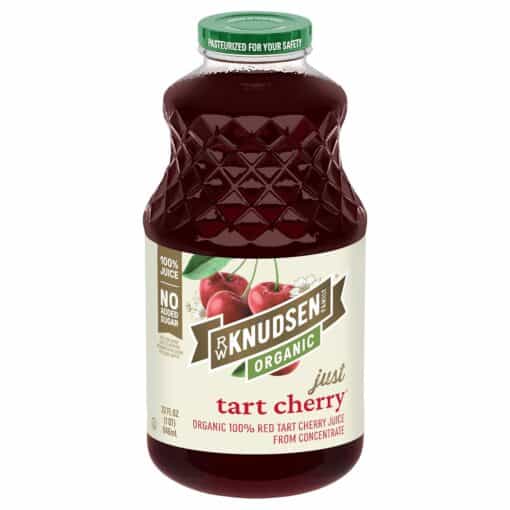
2. Melatonin Supplements
Melatonin naturally declines with age, especially during menopause. Supplementing with a small dose (0.5 to 3 mg) about 30–60 minutes before bed can help reset your circadian rhythm.
Key tip: More isn’t better. Too high a dose can actually make you groggy or cause middle-of-the-night wakeups. Look for slow-release formulations for steady overnight effects.
I use melatonin occasionally, mainly after travel or during stressful weeks, and it reliably helps my body remember what nighttime is supposed to feel like.
That said, I sometimes get really vivid dreams or nightmares from it, so I usually stick to a gentler combo of magnesium, lemon balm, and L-theanine when I just need to unwind without the mental fireworks.
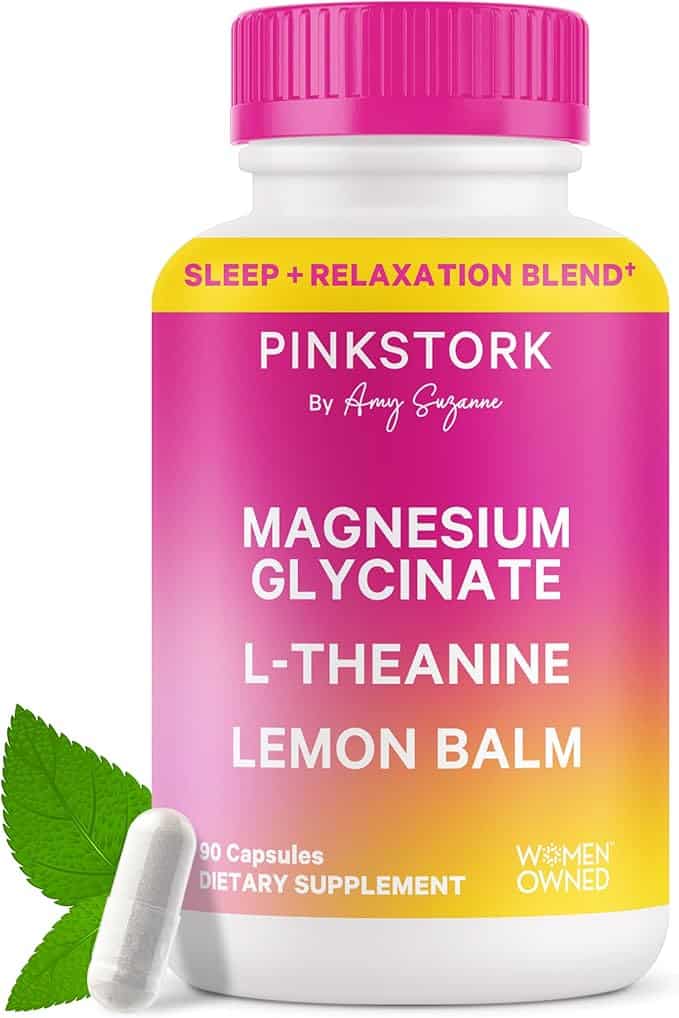
3. Magnesium (Glycinate or L-Threonate)
If you’re constantly tense, twitchy, or waking with muscle cramps, you might be low on magnesium. Stress and sweating deplete it, and deficiency is linked with poor sleep quality .
Magnesium glycinate is the most calming and gentle form for digestion, while L-threonate crosses the blood-brain barrier, supporting relaxation and GABA receptor activity to quiet the mind before sleep.
I take glycinate before bed. It helps my muscles unclench and quiets that restless leg feeling that menopause seems to amplify. However, whenever I alternate with L-threonate, I notice that I seem to fall asleep quicker.
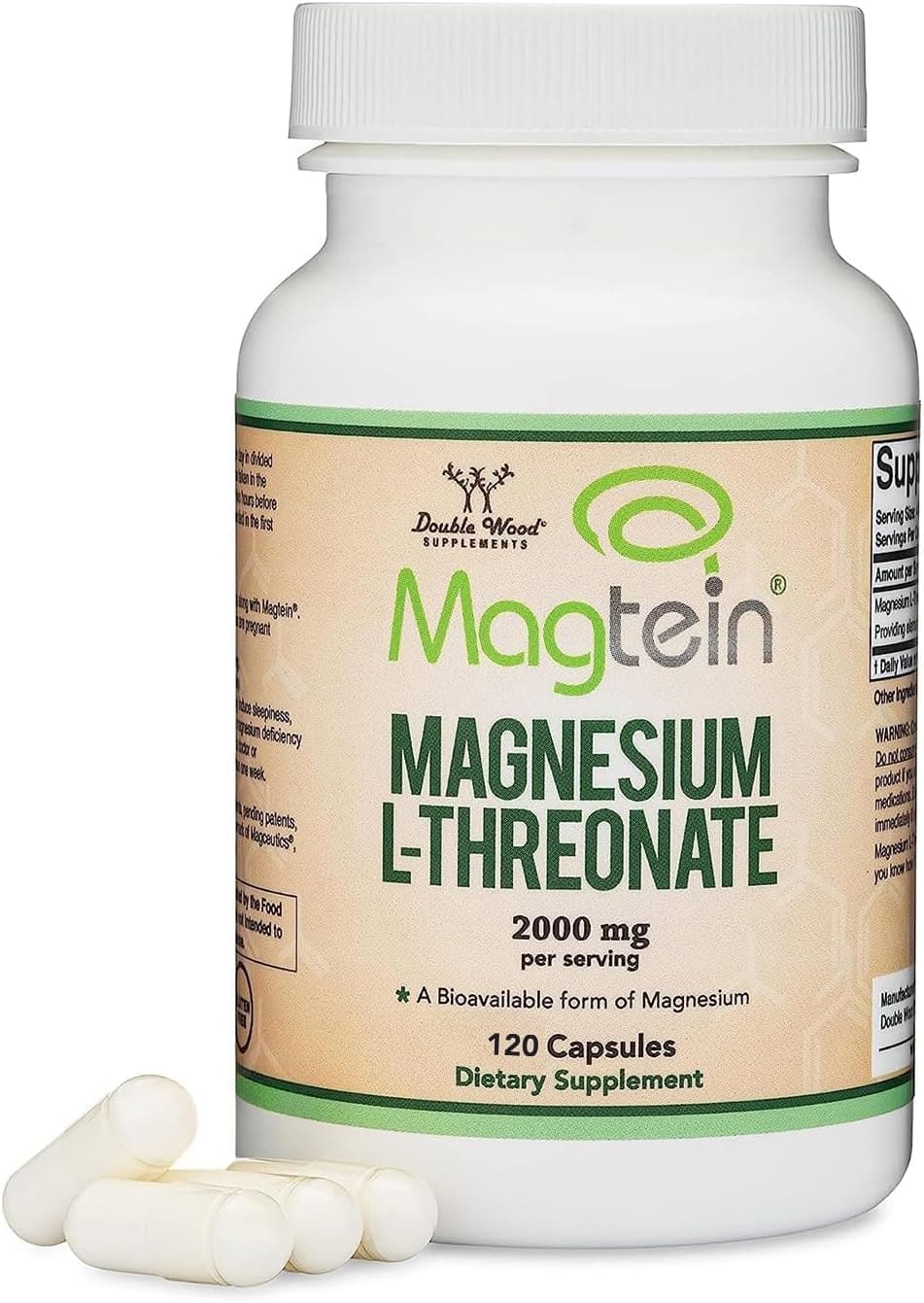
4. L-Theanine
Found naturally in green tea, L-theanine helps calm the mind without making you drowsy. It increases alpha brain waves, promoting the same relaxed alertness you feel during meditation.
I use it when my mind races before bed. Within 30 minutes, that loop of thoughts starts to slow down, and it pairs well with magnesium, melatonin, reishi mushroom, or lemon balm for deeper rest.
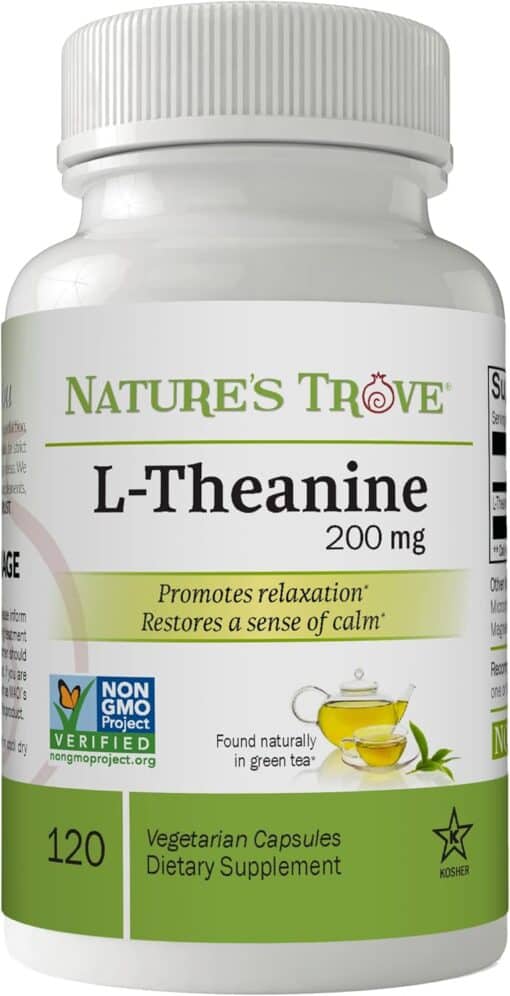
5. 5-HTP
This amino acid helps your body produce serotonin, which then converts into melatonin. 5-HTP may help smooth mood swings and promote relaxation, especially when taken earlier in the evening.
Start small (50 mg is plenty for most people) and avoid combining it with antidepressants. I find it helps even out my evenings, especially during anxious or irritable weeks.
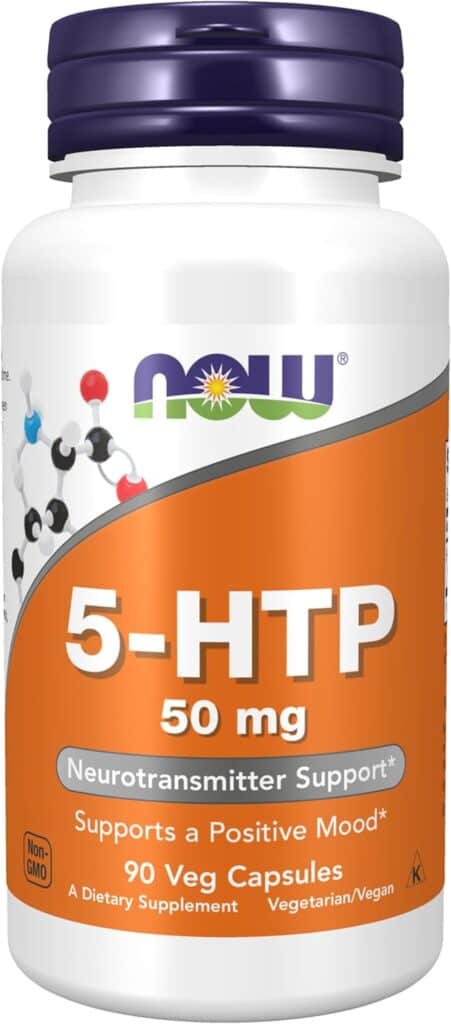
6. Ashwagandha
Ashwagandha is one of my favorite adaptogens. It helps your body cope with stress by balancing cortisol levels, which tend to spike unpredictably during menopause.
When cortisol is high at night, you feel alert instead of sleepy. Ashwagandha helps reset that rhythm. I take it mid-afternoon, and by bedtime, I’m noticeably calmer.
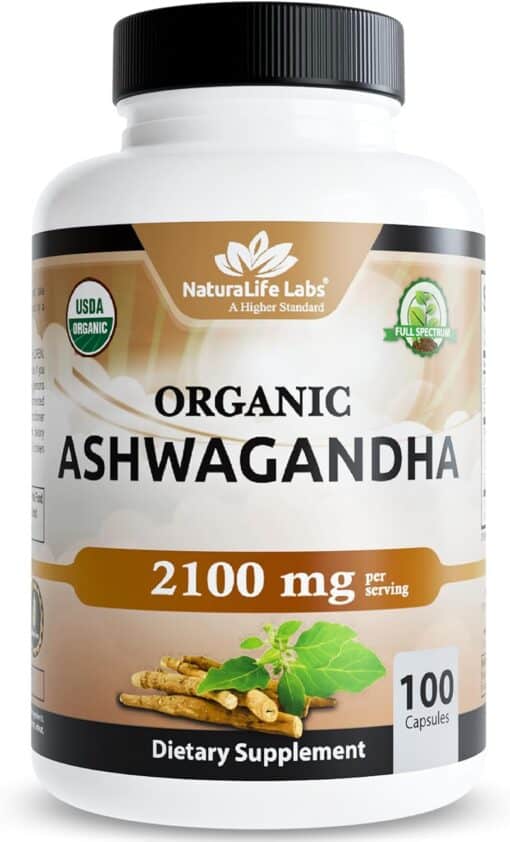
7. Reishi Mushroom
I tried Reishi on a friend’s recommendation, half-expecting it to taste like dirt and do nothing. Instead, it quickly became one of my favorite wind-down capsules.
Reishi supports the nervous system and adrenal balance, helping your body adapt to stress while promoting a sense of calm. It’s not a knockout mushroom (you won’t feel drowsy) but it helps you want to rest.
I take Reishi as a warm evening tea (it’s delicious with cacao or cinnamon), and it’s the kind of calm that sneaks up on you.
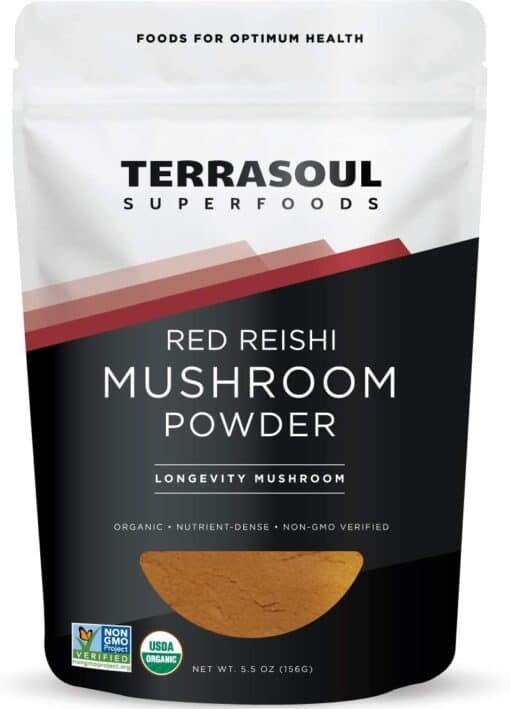
8. Valerian Root & Hops
If your brain won’t shut up after midnight, this duo is worth a try. Valerian and hops work synergistically to activate GABA receptors, creating a mild sedative effect.
You’ll just drift off more smoothly and stay asleep longer. It’s especially helpful for those “wired but tired” nights that come with hormone fluctuations.
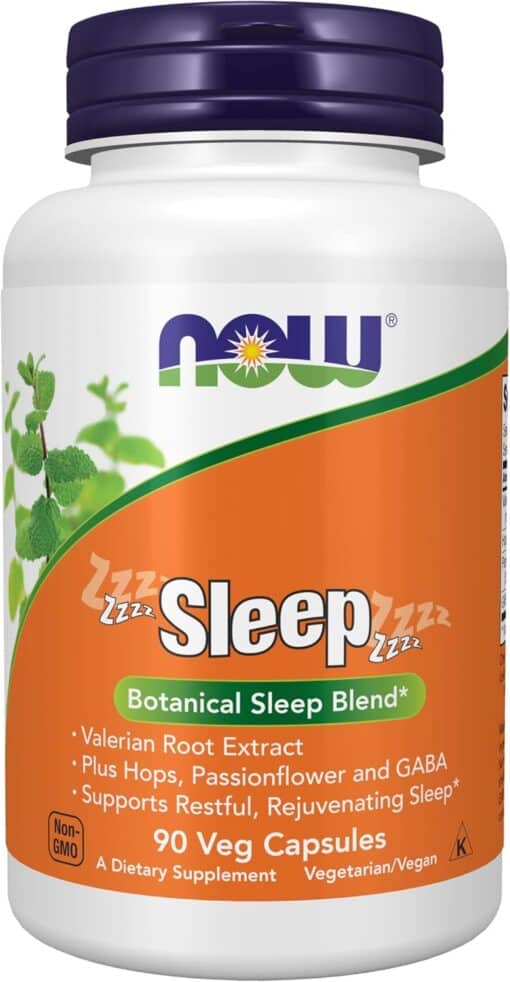
9. Lemon Balm
Lemon balm smells like summer in a cup, but its effects are even better. It’s a gentle anxiolytic herb that supports relaxation and digestion, two things that often suffer during menopause..
I grow it in my backyard, and sometimes I’ll just bruise a few leaves in hot water, and it’s instant calm.
You can also buy lemon balm tea, a tincture, or capsules.
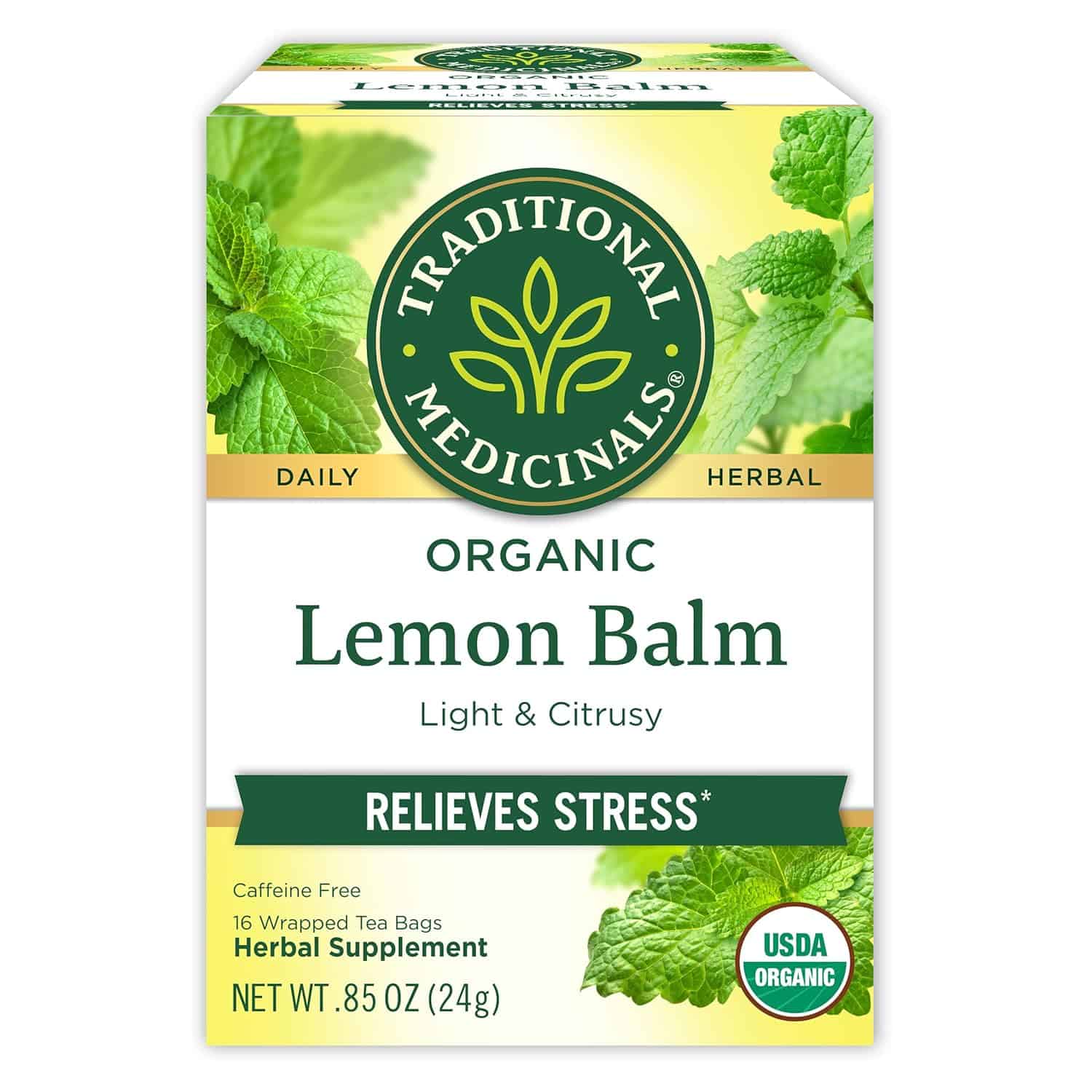
10. Passion Flower
Passion flower has a long history in herbal medicine as a natural sleep aid. It boosts GABA levels and soothes racing thoughts.
I tried it after reading about its use in combination formulas for menopausal women. Within a few nights, my sleep felt less fragmented. Bonus: it’s one of the few herbs that also helps with mild anxiety
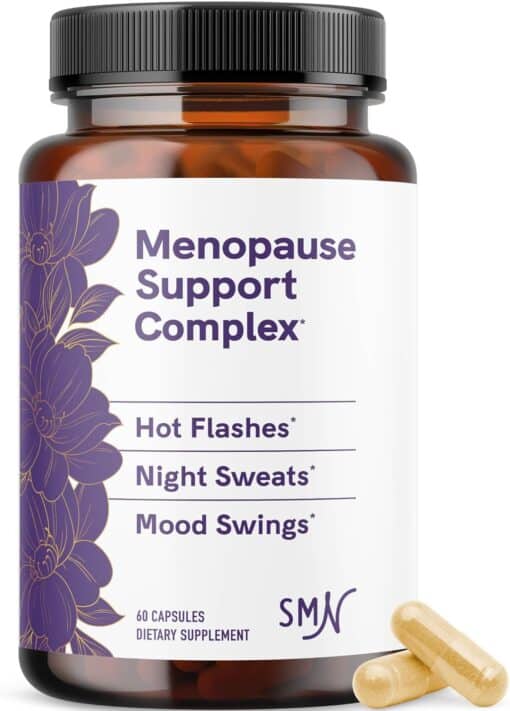
11. Evening Primrose Oil
Rich in gamma-linolenic acid (GLA), evening primrose oil may help regulate hormones and reduce the severity of hot flashes.
I like it as part of my broader supplement rotation; it’s subtle, but over a few weeks, I’ve noticed steadier moods and fewer temperature swings.
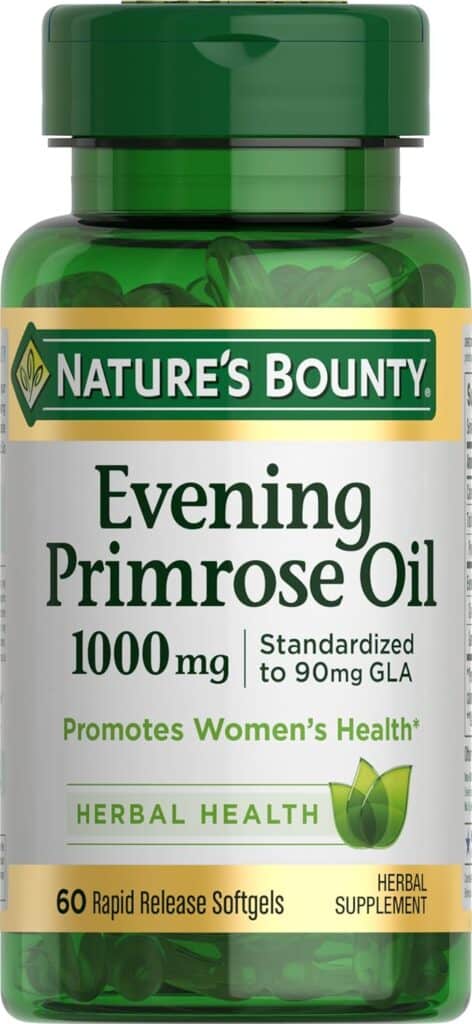
12. Black Cohosh
Black cohosh is one of the best-studied herbal remedies for menopause symptoms. It may act on serotonin receptors to reduce hot flashes and improve sleep quality.
For some women, this herb alone can significantly reduce nighttime sweating.
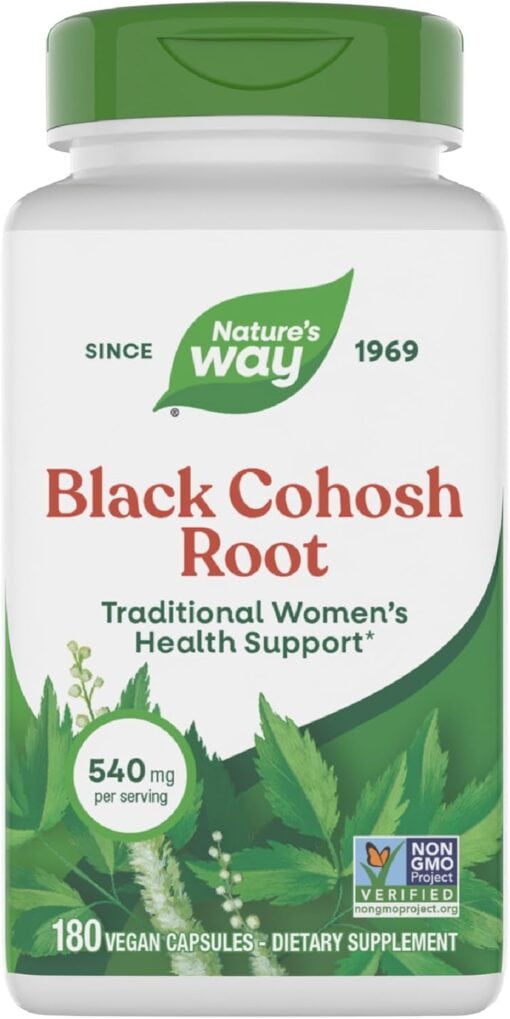
13. Red Clover
Red clover contains isoflavones, a type of phytoestrogen that mimics the effects of estrogen in the body. It may gently support hormonal balance and lessen hot flashes.
I’ve found red clover teas, tinctures, and capsules helpful, but consistency matters. It’s a slow-burn remedy that rewards daily use.
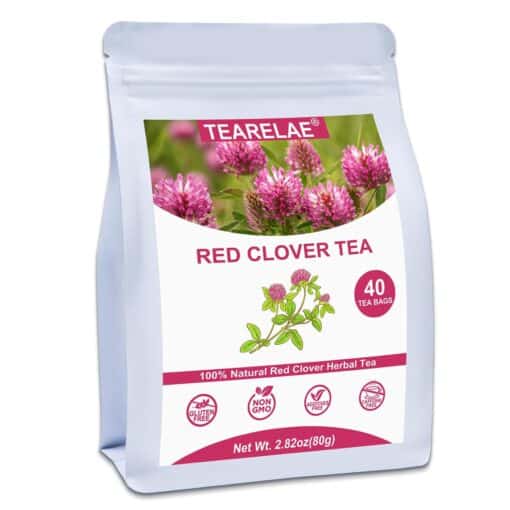
14. Magnolia Bark
Magnolia bark is underrated. It’s been used in traditional Chinese medicine for centuries to ease anxiety and promote sleep. It may even reduce nighttime cortisol spikes (source).
It’s particularly good if your insomnia feels stress-driven. I like it as an evening tea or in capsule form for its calming, grounding effect.
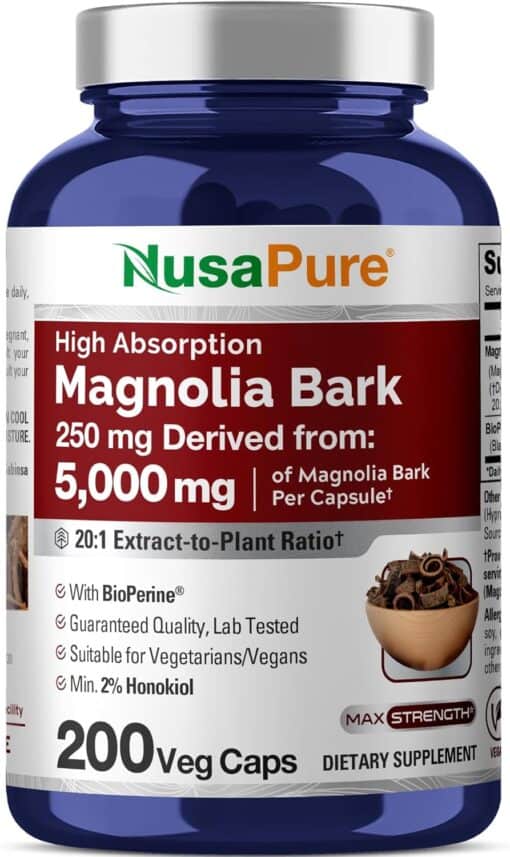
15. Room Temperature & Cooling Environment
If I had to choose one non-negotiable, this would be it. Keeping your bedroom between 65–72°F (18–22°C) helps your body stay in the optimal sleep zone.
Use breathable bedding (cotton, linen, or bamboo) and avoid synthetics that trap heat. Blackout curtains and fans help too, but for true relief, smart cooling tech takes it up a notch.
16. Lifestyle Tweaks
No supplement can outwork poor habits. Balance your nutrition, movement, and stress management:
- Eat balanced meals with complex carbs, lean proteins, and healthy fats.
- Get regular exercise. Yoga and Pilates are gentle and regulate hormones.
- Limit alcohol and caffeine.
- Practice relaxation techniques: breathwork, meditation, or journaling before bed.
Think of this as building a foundation; everything else works better when your lifestyle supports it.
Smart Tech Solutions for Menopause Insomnia
Natural remedies help balance your body, but sometimes the real culprit is heat, and that’s where technology comes in.
Cooling and sleep-tracking tools can make a huge difference when your hormones are playing temperature roulette.
Eight Sleep Pod Cover: Best for Smart Cooling
The Eight Sleep Pod Cover was my turning point. The first night I tried it, my usual 2 a.m. wakeup didn’t happen. It adjusts temperature throughout the night, cooling you during hot flashes and warming you back up after.
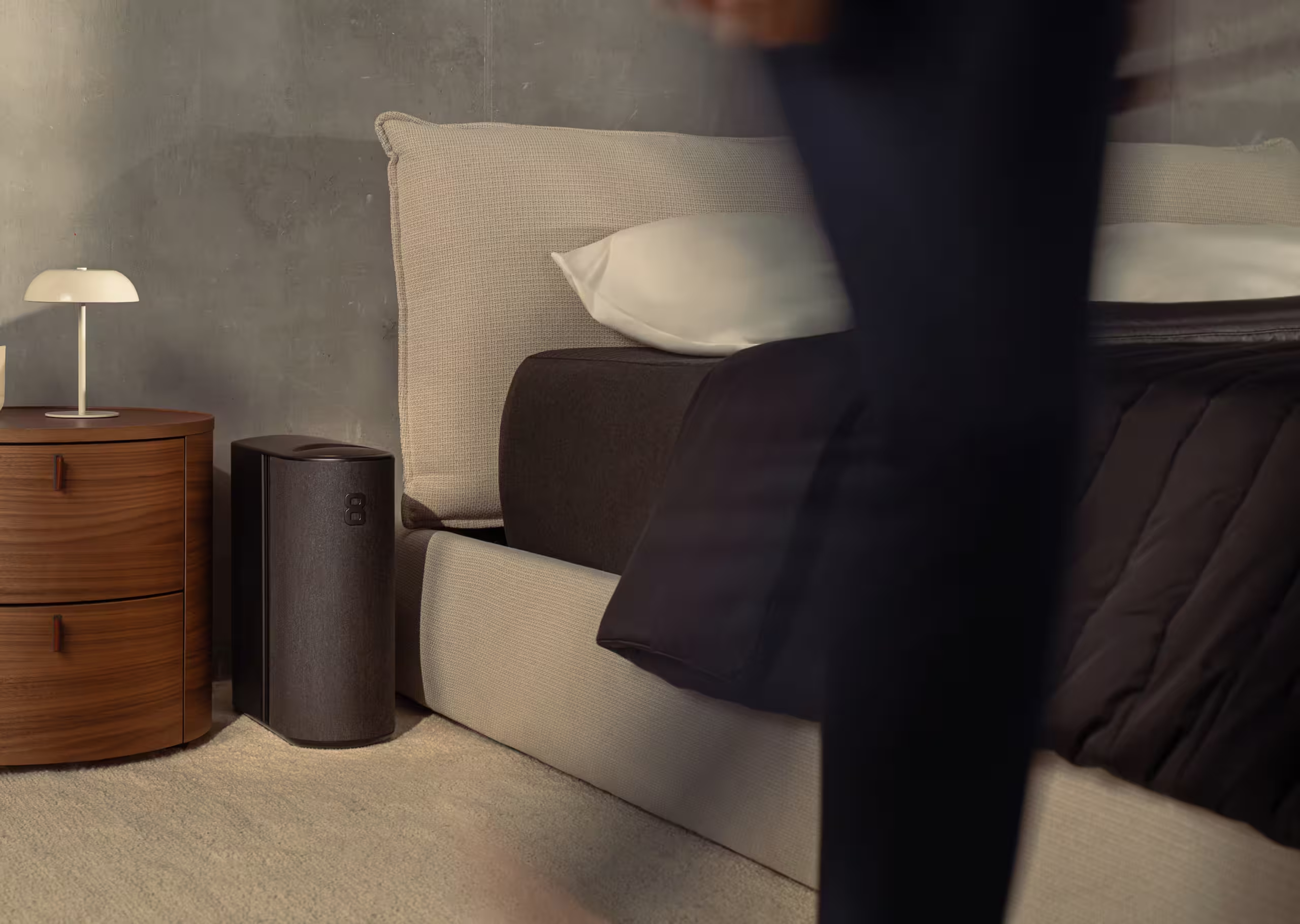
Key Benefits:
- Dual-zone temperature control (great for couples)
- Tracks sleep stages and recovery via app
- Automatically adapts to your sleep patterns
- Clinically shown to improve deep and REM sleep
BedJet 3 Climate System: Best for Air Cooling Without a Smart Bed
The BedJet 3 is like a hairdryer for your sheets, but in a good way. It blows cool or warm air directly into your bedding.
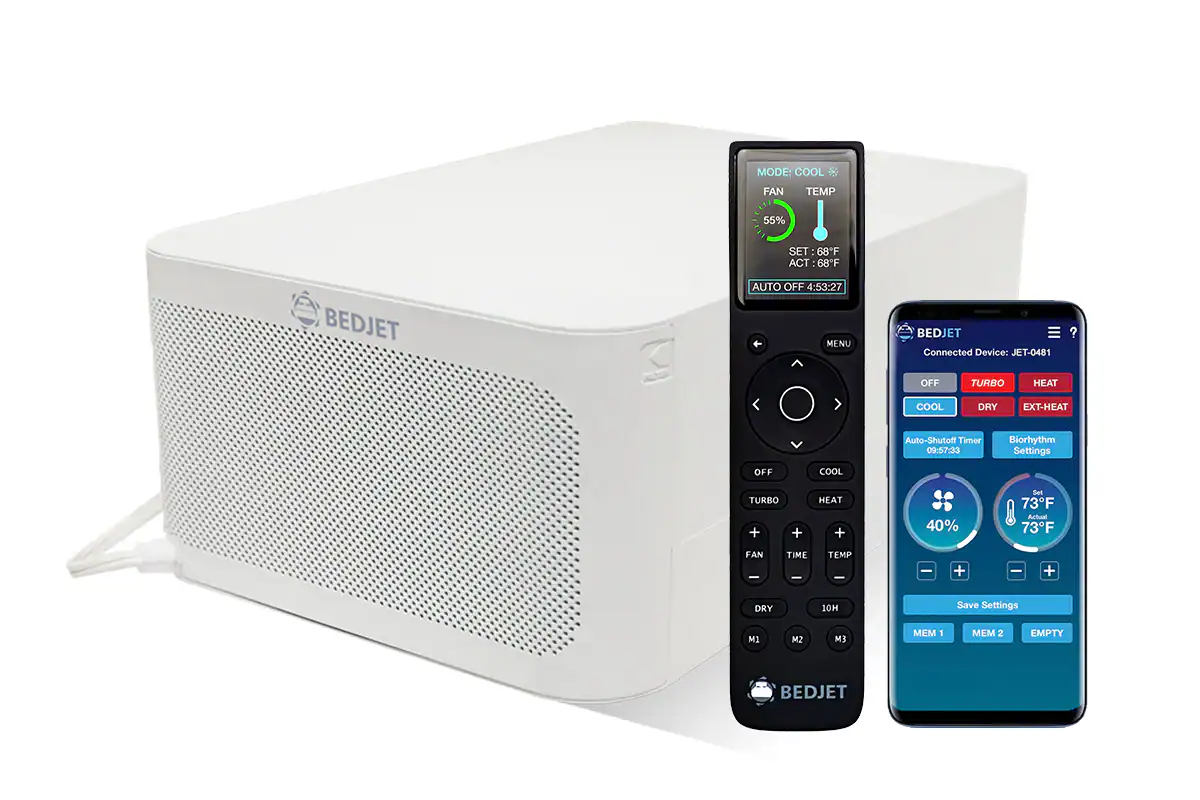
Key Benefits:
- Adjustable airflow and temperature
- Quick install, no tech learning curve
- Affordable compared to full smart systems
Perfect if you sleep hot but don’t want to commit to a full mattress upgrade.
Chilipad Dock Pro by Sleep.me: Best for Customizable Cooling Power
If you like the idea of cooling technology but don’t want to commit to a full smart-bed setup, the Chilipad Dock Pro is a great middle ground. It fits over your existing mattress and under the fitted sheet and lets you dial in the exact temperature you want, anywhere between 55°F and 115°F (13°C to 46°C).

Key Benefits:
- Rapid cooling and warming on each side of the bed (dual-zone option available)
- App-controlled scheduling to maintain the ideal temperature all night
- Whisper-quiet system with no electrical components in the mattress (zero EMFs)
It’s not as data-heavy as the Eight Sleep Pod, but if you want reliable cooling without a subscription, this system keeps your bed perfectly temperate through even the hottest nights.
ThermaCycle Water Pad: Best for Travelers
A travel-friendly, water-circulating pad that cools (or heats) your bed surface.
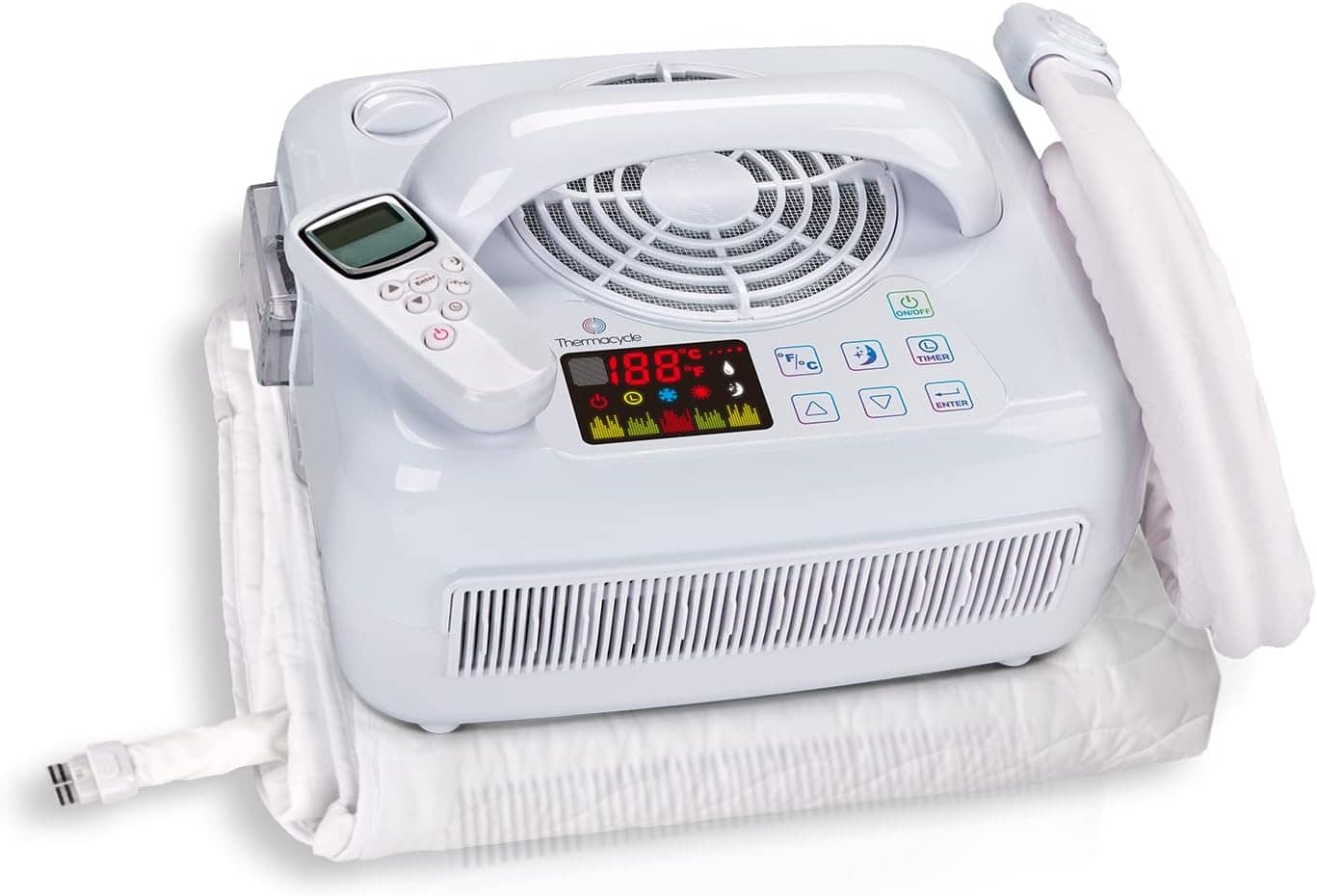
Key Benefits:
- Compact, quiet, and adjustable
- Provides uniform cooling
- Ideal for shared or hotel beds
It’s like bringing your cooling system on vacation.
When to Seek Extra Support
If you’ve layered lifestyle tweaks, herbs, and cooling tech but still struggle with chronic insomnia, it may be time for professional help. Persistent sleep disruption can signal deeper issues like anxiety, depression, or sleep apnea.
Evidence shows cognitive behavioral therapy for insomnia (CBT-I) is one of the most effective first-line treatments for menopausal sleep problems. You might also explore hormone therapy or integrative care with your doctor if natural approaches aren’t enough.
Sleep is a biological necessity, not a luxury. So don’t wait until exhaustion becomes your norm.
FAQs About Menopause and Sleeping Struggles
How Long Before Natural Remedies Start Working?
Give herbs and adaptogens 3–4 weeks. Some work faster (like magnesium or L-theanine), while others take time to build up.
Are Supplements Like black Cohosh or Red Clover Safe Long-Term?
Generally, yes, but consult your doctor if you’re on medications or have hormone-sensitive conditions.
What Temperature Should my Bedroom be During Menopause?
Between 65–72°F (18–22°C) is ideal for most women.
Will Tech Like the Eight Sleep Pod Solve Hot Flashes on its Own?
No device replaces hormonal balance, but cooling technology helps you sleep through the symptoms instead of waking up from them.
Are Herbal Supplements Safe During Menopause?
Generally, yes, if you buy from reputable brands and check interactions. Always talk to your healthcare provider before combining supplements with medications.
Sleep Like You Again (Yes, It’s Possible)
Menopause changes your sleep, but it doesn’t have to steal it. When you combine natural support, like herbs, nutrients, and bedtime rituals, with smart cooling tools like Eight Sleep, you can finally rest without the drama.
Start with one or two remedies tonight. Maybe it’s a mug of chamomile, a magnesium capsule, or a slightly cooler room. Then build from there.
Sleep isn’t something you chase; it’s something you relearn. And trust me, once you get it back, you’ll never take it for granted again.

